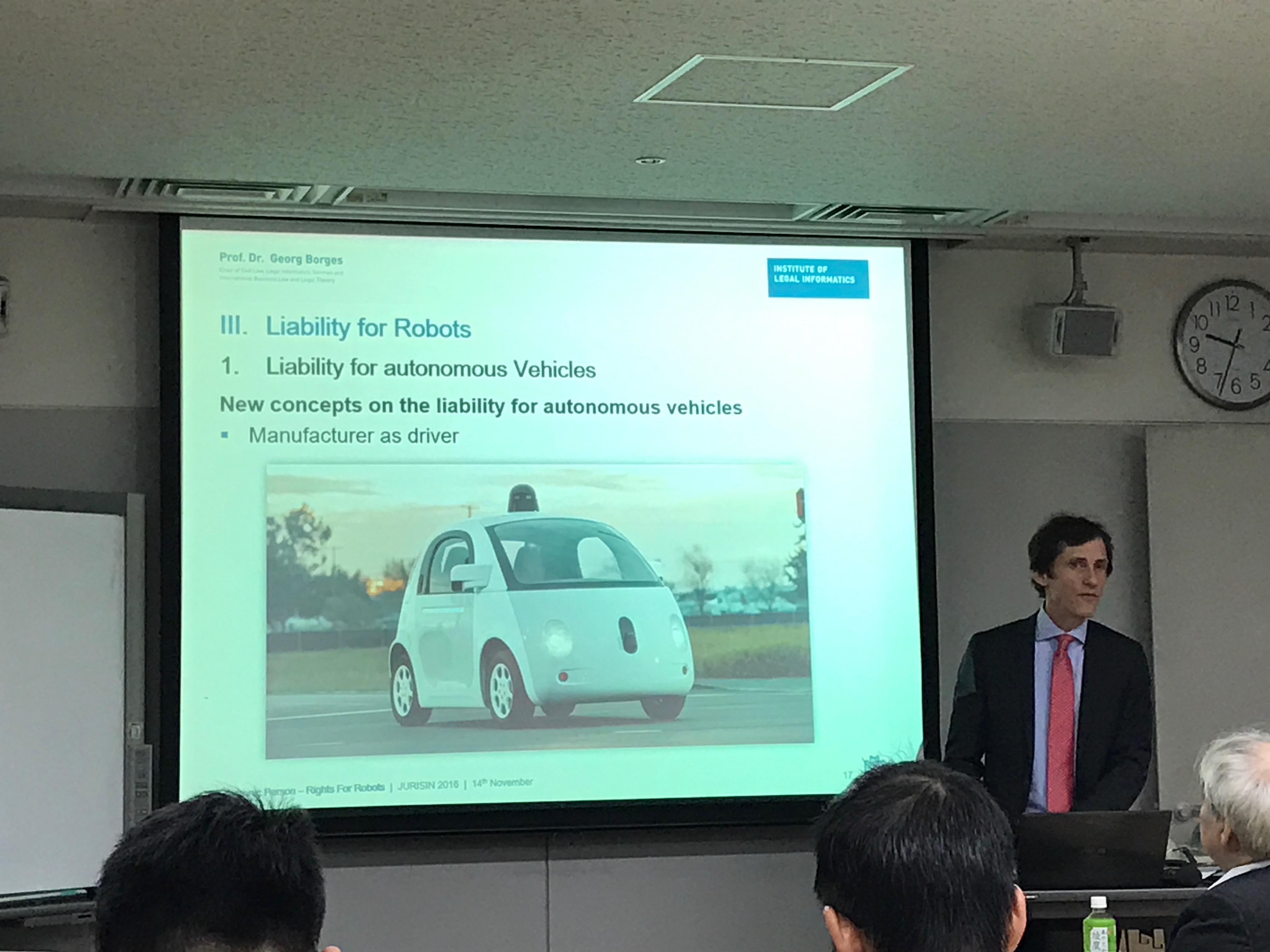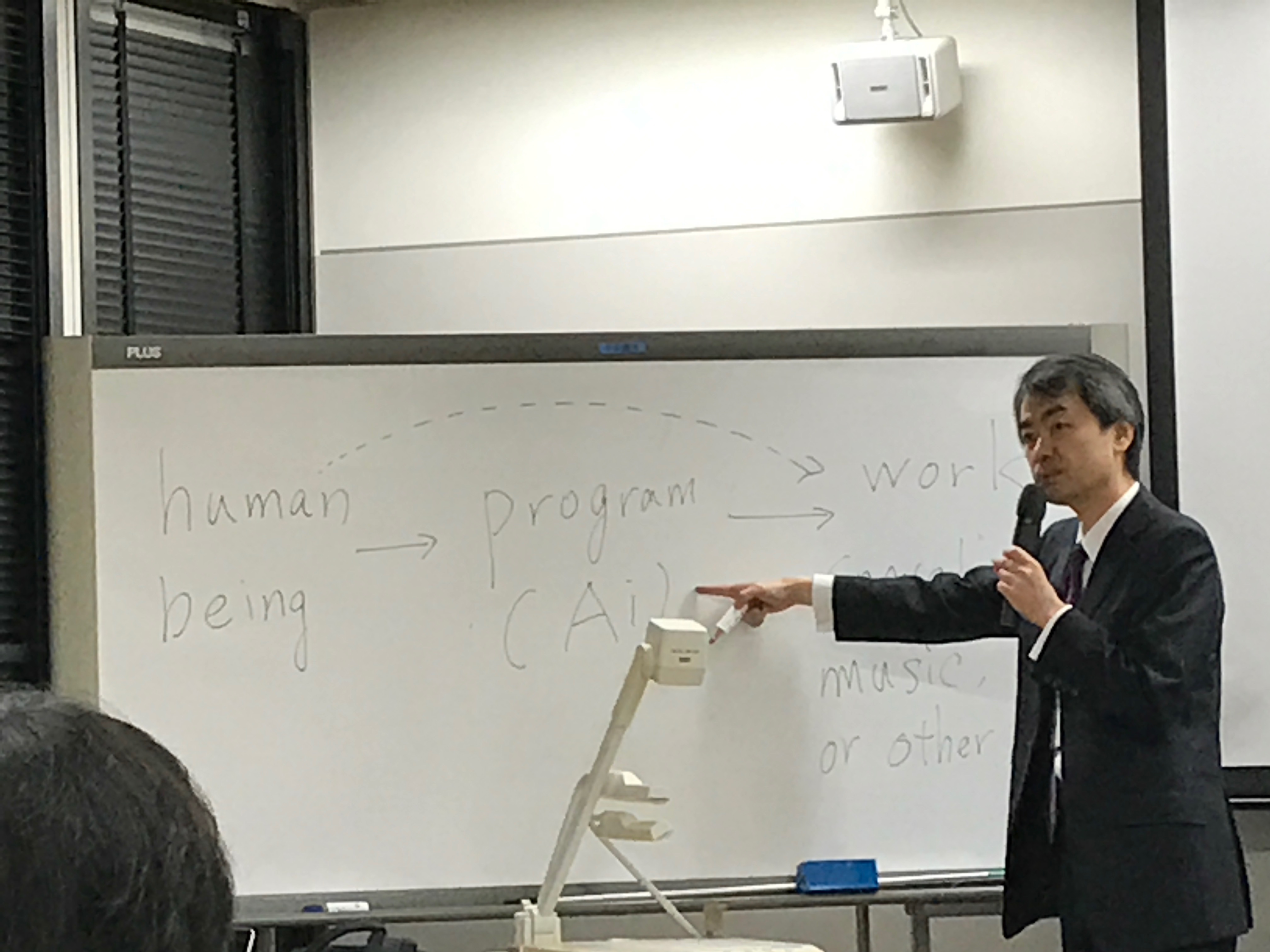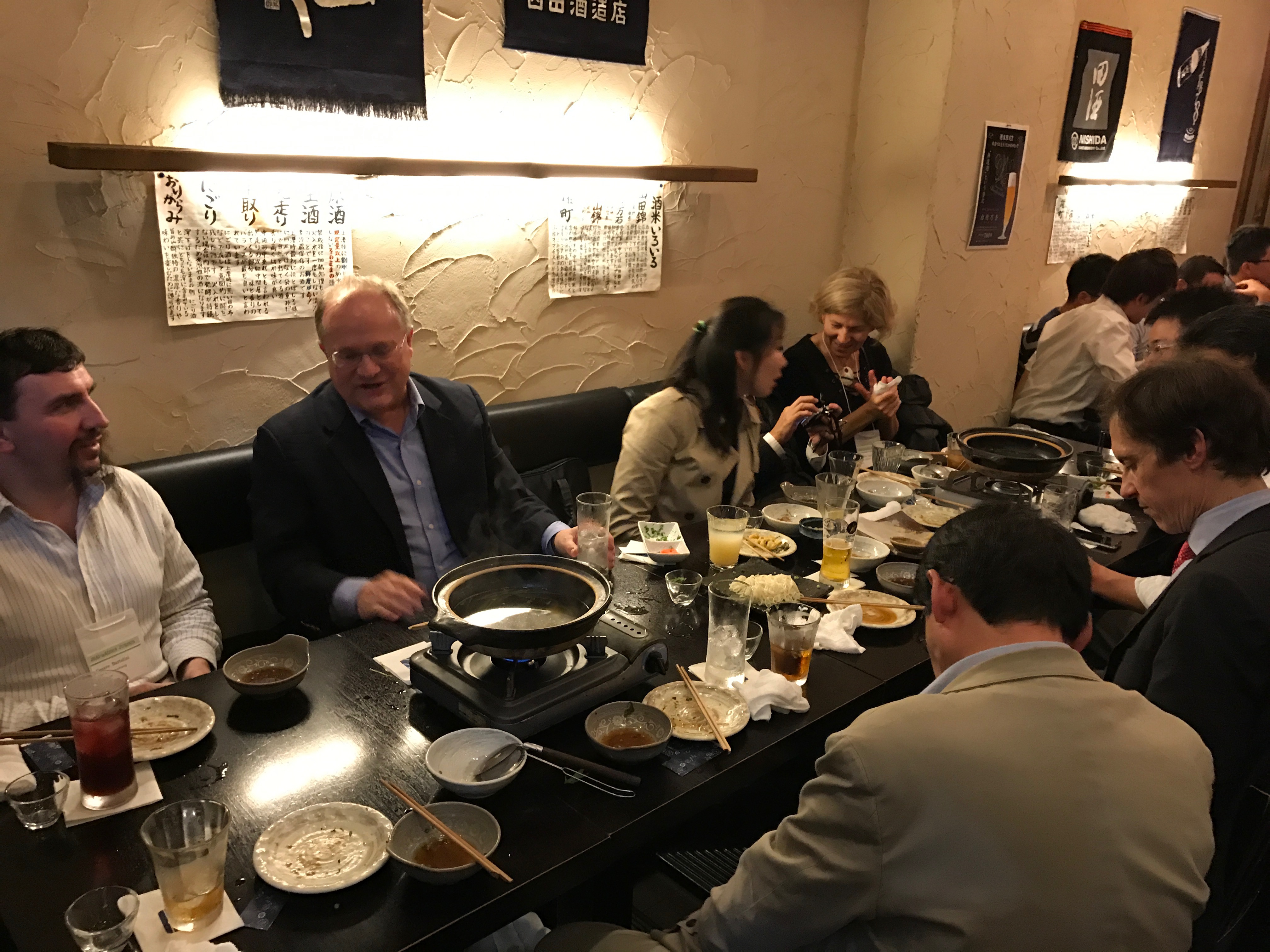Tenth International Workshop on Juris-informatics
(JURISIN 2016)
associated with JSAI International Symposia on AI 2016 (IsAI-2016)
November 14 - 15, 2016
New Information
NEWThank you!!
 Invited Talk 1 by Prof. Georg Borges
Invited Talk 1 by Prof. Georg Borges Invited Talk 2 by Prof. Harumichi Yuasa
Invited Talk 2 by Prof. Harumichi Yuasa Dinner
DinnerTentative Program has been open. (October 22, 2016)
Notification has been sent. (October 3, 2016)
Due to many requests, we have extended submission deadline by September 5. (August 21, 2016)
We are happy to announce that Georg Borges, Profossor of Saarland University, Germany and Harumichi Yuasa, Professor of Institute of Information Security, Japan will give an invited talk. (August 21, 2016)
The double submission policy with JURIX2016 is noted below. (June 6, 2016)
This website is open! (May 27, 2016)
Aims and Scope
Juris-informatics is a new research area which studies legal issues from the perspective of informatics. The purpose of this workshop is to discuss both the fundamental and practical issues among people from the various backgrounds such as law, social science, information and intelligent technology, logic and philosophy, including the conventional "AI and law" area. We solicit unpublished papers on theories, technologies and applications on juris-informatics.
Important Dates
Registration
Please register the workshop at registration page of JSAI International Symposia on AI 2016.
Topics
Relevant topics include, but are not limited to, the following:
- Model of legal reasoning
- Argumentation / Negotiation / Argumentation agent
- Legal term ontology
- Formal legal knowledge-base / Intelligent management of legal knowledge-base
- Translation of legal documents
- Information retrieval of legal texts
- Computer-aided law education
- Use of Informatics and AI in law
- Legal issues on ubiquitous computing / multi-agent system / the Internet
- Social implications of use of informatics and AI in law
- Natural language processing for legal knowledge
- Verification and validation of legal knowledge systems
- Any theories and technologies which is not directly related with juris-informatics but has a potential to contribute to this domain
Bar Exam Competition
This year, JURISIN invites participation in a legal information extraction and entailment competition. Previous conferences/workshops have not conducted such a shared task on a large legal data collection, so we hope that the 2015 workshop will help establish a major experimental effort in the legal information extraction/retrieval field. The motivation for the competition is to help create a research community of practice for the capture and use of legal information.Please visit the homepage of the bar exam competition.
http://webdocs.cs.ualberta.ca/~miyoung2/COLIEE2016/
Invited Speakers
Georg Borges (Saarland University, Germany)
Harumichi Yuasa (Institute of Information Security, Japan)
Submissions
We welcome and encourage the submission of high quality, original papers, which are not simultaneously submitted for publication elsewhere except as a submission to JURIX 2016 (The 29th International Conference on Legal Knowledge and Information Systems). The double submission policy with JURIX 2016 is as follows:
- Papers being submitted both to JURISIN2016 and JURIX2016 must note this on the title page.
- A paper to be presented at JURISIN2016 must be withdrawn from JURIX2016 and vice versa according to the choice by the authors.
- If the authors do not follow this double submission policy, the paper by the authors will not be included in the proceedings of JURISIN2016.
Papers should be written in English, formatted according to the Springer Verlag LNCS style in a pdf form, which can be obtained from http://www.springeronline.com and not exceed 14 pages including figures, references, etc. If you use a word file, please follow the instruction of the format, and then convert it into a pdf form and submit it at the paper submission page. If a paper is accepted, at least one author of the paper must register the workshop and present it. We strongly encourage an online registration.
You can submit your paper at "https://easychair.org/conferences/?conf=jurisin2016".If you cannot submit a paper by EasyChair System by some trouble, please send email to:

Post Proceedings
Selected papers will be published as a post-proceedings via Springer Verlag LNAI after the second round of review after the workshop.
The selected papers of the previous workshops were published as volumes of LNAI4914(JURISIN 2007), LNAI5447(JURISIN 2008), LNAI6284(JURISIN 2009) , LNAI6797(JURISIN2010), LNAI7258(JURISIN2011), LNAI7856(JURISIN2012), LNAI8417(JURISIN2013), LNAI9067(JURISIN2014), and TBA (JURISIN2015).
JURISIN2016 Programme (November 14, 2016)
09:10-10:10 Invited Talk:
Georg Borges (Saarland University, Germany)
Title: Electronic Person - rights for robot
Abstract: The European Parliament's draft report on Civil Law Rules on Robotics is understood to be aiming at the conception of a legal framework for robots classifying autonomous robots as ``electronic persons'' with specific rights and obligations. The concept of attributing rights and obligation to a robot – instead of to it's owner or producer – implicates nothing less than a revolution in law and legal philosophy. In the presenation, the concept will be discussed from a regulatory perpective and the benefits and risks of the concept examined.
10:10-10:30 Coffee break10:30-11:00 A Formal Analysis of Legal Reasoning
Yasuo Nakayama
11:00-11:30 A Framework to Reason about the Legal Compliance of Security Standards
Cesare Bartolini, Andra Giurgiu, Lenzini Gabriele and Livio Robaldo
11:30-13:00 Lunch
13:00-14:00 Plenary Talk (Gallery Space):
Fernando Koch, ACM Distinguished Speaker
Invited Professor at Korea University, Graduate School of Management of Technology
Honorary Senior Fellow, The University of Melbourne
Topics: Artificial Language/Machine Learning,Computers and Society,Emerging Technologies,Science & Computing
Abstract: The new generation of technology development -- including Computational intelligence, Cognitive Computing, Internet of Things, Social Computing and Virtual Reality, and others ? will disrupt the economic and social model of every human endeavor. Advances in these domains are inevitable, irreversible, and their impact is immeasurable. The questions are: how to promote strategies to embrace, commercialize, and monetize these new technologies? How to prepare business and society to this new technology revolution? And, how to position current business to be part of this evolution reaping the benefits of disruptive technologies?
14:00-14:30 Coffee break14:30-15:00 A Method to Estimate Document Structure from Unstructured Documents
Yoichi Hatsutori, Katsumasa Yoshikawa and Haruki Imai
15:00-15:30 Voluntary Manslaughter? Intention-to-Kill in Meta-Argumentation with Supports
Ryuta Arisaka and Ken Satoh
15:30-16:00 Modeling Attempt Crime in Criminal Law
Jiraporn Pooksook, Phan Minh Dung and Ken Satoh
16:00-16:30 Coffee break
16:30-17:00 Argument-based Logic Programming for Analogical Reasoning
Teeradaj Racharak, Satoshi Tojo, Nguyen Duy Hung and Prachya Boonkwan
17:00-17:30 Dischargeable Obligations in ALP: A case study from the Japanese Civil Code
Marco Alberti, Marco Gavanelli, Evelina Lamma, Fabrizio Riguzzi and Riccardo Zese
JURISIN2016 Programme (November 15, 2016)
9:30-10:30 Invited Talk:Harumichi Yuasa (Institute of Information Security, Japan)
Title: Technological Development and Japanese Law regarding Artificial Intelligence
Abstract: Thanks to the development and deepening of cutting-edge technology in AI (Artificial Intelligence) it is becoming possible for AI to create sophisticated creations and perform decision making which previously only a human could. However, the current Japanese legal system gives fact that rights and duties are both based on natural or juridical persons. Hence it is urgently necessary to consider whether to acknowledge the rights of the AI's creation and to whom (or what) responsibilities resulting from the AI's action belongs. The Japanese government is currently engaged in revising our act, rules, and guidelines for medical diagnosis systems and radio waves use by robots. They also need to fundamentally reexamine the rights and duties of AI. To consider and confirm the principles of the whole AI legislation is a challenge for Japanese laws.
10:30-11:00 Coffee break11:00-18:00 COLIEE-2016 (Competition on Legal Information Extractionn and Entailment) Session
11:00-11:30 COLIEE-2016: Evaluation of the Competition on Legal Information Extraction and Entailment
Mi-Young Kim, Randy Goebel, Yoshinobu Kano and Ken Satoh
11:30-12:00 An Approach to Information Retrieval and Question Answering in the Legal Domain
Kolawole John Adebayo, Luigi Di Caro, Guido Boella and Cesare Bartolini
12:00-12:30 Legal Question Answering Using Paraphrasing and Entailment Analysis
Mi-Young Kim, Ying Xu, Yao Lu and Randy Goebel
12:30-14:00 Lunch
14:00-14:30 Legal Question Answering using Ranking SVM and Deep Convolutional Neural Network
Phong-Khac Do, Huy-Tien Nguyen, Chien-Xuan Tran, Minh-Tien Nguyen and Nguyen Le Minh
14:30-15:00 Legal Yes/No Question Answering System using Case-Role Analysis
Ryosuke Taniguchi and Yoshinobu Kano
15:00-15:30 An Ensemble Based Legal Information Retrieval and Entailment System
Kiyoun Kim, Seongwan Heo, Sungchul Jung, Kihyun Hong and Young-Yik Rhim
15:30-16:00 Coffee break
16:00-16:30 Legal Information Extraction/Entailment Using SVM-Ranking and Tree-based Convolutional Neural Network
Truong-Son Nguyen, Viet-Anh Phan, Thanh-Huy Nguyen, Hai-Long Trieu, Ngoc-Phuong Chau, Trung-Tin Pham and Nguyen Le Minh
16:30-17:00 Lexical to Discourse-level Corpus Modeling for Legal Question Answering
Danilo Carvalho, Vu Tran, Khanh Tran, Viet Lai and Nguyen Le Minh
17:00-17:30 Civil Code Article Information Retrieval System based on Legal Terminology and Civil Code Article Structure
Daiki Onodera and Masaharu Yoshioka
17:30-17:40 Closing Remarks
Workshop Chair
Makoto Nakamura, Nagoya University, Japan
Seiichiro Sakurai, Meiji Gakuin University, Japan
Katsuhiko Toyama, Nagoya University, Japan
Steering Committee Members
Takehiko Kasahara, Toin Yokohama University
Makoto Nakamura, Nagoya University, Japan
Katsumi Nitta, Tokyo Institute of Technology, Japan
Seiichiro Sakurai, Meiji Gakuin University, Japan
Ken Satoh, National Institute of Informatics and Sokendai, Japan
Satoshi Tojo, Japan Advanced Institute of Science and Technology(JAIST), Japan
Katsuhiko Toyama, Nagoya University, Japan
Advisory Committee Members
Trevor Bench-Capon, The University of Liverpool, UK
Tomas Gordon, Fraunfoher FOKUS, Germany
Henry Prakken, University of Utrecht & Groningen, The Netherlands
John Zeleznikow, Victoria University, Australia
Robert Kowalski, Imperial College London, UK
Kevin Ashley, University of Pittsburgh, USA
Program Committee Members (Tentative)
Thomas Agotnes, University of Bergen, Norway
Floris Bex, Utrecht University, The Netherlands
Randy Goebel, University of Alberta, Canada
Guido Governatori, NICTA, Australia
Yoichi Hatsutori, IBM Japan Ltd., Japan
Tokuyasu Kakuta, Chuo University, Japan
Yoshinobu Kano, Shizuoka University, Japan
Takehiko Kasahara, Toin Yokohama University, Japan
Mi-Young Kim, University of Alberta, Canada
Beishui Liao, Zhejiang University, China
Makoto Nakamura, Nagoya University, Japan
Le-Minh Nguyen, Japan Advanced Institute of Science and Technology(JAIST), Japan
Katumi Nitta, Tokyo Institute of Technology, Japan
Paulo Novais, University of Minho, Portugal
Julian Padget, University of Bath, UK
Ginevra Peruginelli, ITTIG-CNR, Italy
Seiichiro Sakurai, Meiji Gakuin University, Japan
Katsuhiko Sano, Hokaido University, Japan
Ken Satoh, National Institute of Informatics and Sokendai, Japan
Akira Shimazu, Japan Advanced Institute of Science and Technology(JAIST), Japan
Satoshi Tojo, Japan Advanced Institute of Science and Technology(JAIST), Japan
Katsuhiko Toyama, Nagoya University, Japan
Katsumasa Yoshikawa, IBM Japan Ltd., Japan
Related Links
Preivous JURISIN workshops
- JURISIN2007
- JURISIN2008
- JURISIN2009
- JURISIN2010
- JURISIN2011
- JURISIN2012
- JURISIN2013
- JURISIN2014
- JURISIN2015
For any inquiry concerning the workshop, please send it to: 
JURISIN 2016 home page http://www.kl.i.is.nagoya-u.ac.jp/jurisin2016/
